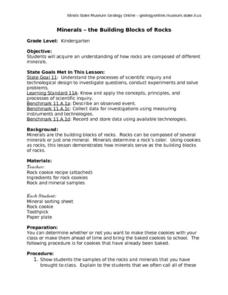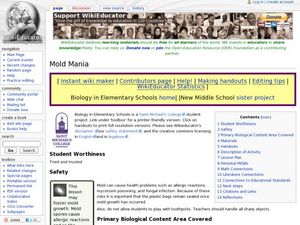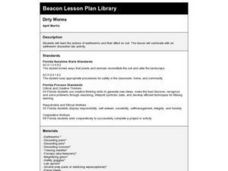Curated OER
Decomposers- Nurse Logs
Pupils investigate temperate forest ecosystems. In this environmental lesson, students discover different forms of decomposition and its effect on the environment.
Curated OER
"The Good, The Bad, and The Smelly."
Young scholars explore insects' use of pheromones and beneficial insects versus insect pests.
Curated OER
Classifying Monocot And Dicot Plants
Sixth graders identify the parts of a flower, and tell the difference between monocots and dicots. They group plant by leaf types and characteristics placing the information in table form on the computer.
Curated OER
Minerals- the Building Blocks of Rocks
Students investigate how rocks are composed minerals by dissecting rock cookies.
Curated OER
Alike and Different
Second graders listen to a book about how farms feed the world. They discuss elements of rural life. They listen to a story about the suburbs and discuss elements specific to a suburban community. They listen to a story about city...
Curated OER
Introduction To Insect & Spider Body Parts
Students inspect several different specimens of insects and spiders to determine characteristics that are similar and different between the two groups. They identify the basic body structure of spiders and insects and then predict where...
Curated OER
LOOKING AT LAWNS
Students investigate the importance of plants to animals by exploring their own schoolyard. They record relevant observations, findings, and measurements, using written language, drawings, charts, and graphs. They describe ways in...
Curated OER
Condensation and the Water Cycle
Students explore the natural distallation process that occurs in the water cycle. They use plastic cups and cotton swabs to observe the condensation process that is evident in the water cycle.
Curated OER
How Big Are Earth, Sun, and Moon?
Third graders draw what they believe is in space on a dry erase board. In groups, they are given a beaker half filled with water and they add a teaspoon of oil, observing the different layers that form. To end the lesson, they identify...
Curated OER
Science is a Wonderland
Students use the scientific method to study Animalia and Plantae Kingdoms. In this science inquiry lesson, students watch a PowerPoint about science process skills. Students complete the National Geographic bottled Eggs-periment or the...
Curated OER
Primary Biological Content Area Covered
Learners use the scientific method to make predictions about mold growth. In this fungus lesson, students use worksheets to help them illustrate predictions and graph mold growth from white to wheat bread. Learners first...
Curated OER
Computer Programming: Learning Alice Programming
Students examine the Alice Program. In this computer programming lesson, students use the drag and drop program method and view a PowerPoint presentation. Students will then create a snowman by using the drag and drop method.
Curated OER
Moving Objects
Students discover the history of the United States by examining the Great Migration. In this U.S. History lesson, students research the immigration movement on the Internet and complete a worksheet about the large population shift. ...
Curated OER
Introduction of the Quarter
Students discuss the quarter. In this money instructional activity, students find the value and characteristics of the quarter. They see how many pennies it takes to equal one quarter.
Curated OER
Applied Science - Science and Math Pre Lab
Students explore human senses. In this applied Science instructional activity, students utilize their senses to distinguish various objects. Students explain their descriptions.
Curated OER
Preventing Hypothermia
Students identify the causes of hypothermia. In this biology lesson, students investigate the different types of heat transfer and heat loss. They discuss several practical measures to avoid hypothermia.
Curated OER
Observation and Discovery
Students explore the basic skills guiding sound scientific invvestigation and methodology. They are introduced to a powerful scientific tool-the microscope. Students review the parts of the microscope. They discuss the inventor of the...
Curated OER
Tagging Race
Students examine and identify plant parts to recognize specific weeds, identify three different weeds, discern differences in weeds quickly, evaluate classmates' weed recognition, and discuss what strategies they used to identify weeds.
Curated OER
Biophilia Space
Students observe what is happening around and within them. They observe a natural environment which is free of conversation, pedestrians or traffic. Afterward, they journal their observation and experience.
Curated OER
Looking into Space
Learners explain how telescopes work and how they can contribute to our knowledge of the universe.
Curated OER
Dirty Worms
Students examine the functions of earthworms and their effect on soil. They conduct an earthworm dissection lab, and complete a checklist.
Curated OER
Lenses and Mirrors
Students investigate lenses and mirrors showing how they bend and reflect light waves.
Curated OER
Particulate Sampler
Students estimate the extent of particulate air pollution present in their neighborhoods.
Curated OER
Who Lives In The Water
Students investigate the environment of a stream or lake to collect and observe macroinvertebrates in their natural environment. They record data and summarize the information obtained. Students look to see if there has been any human...

























